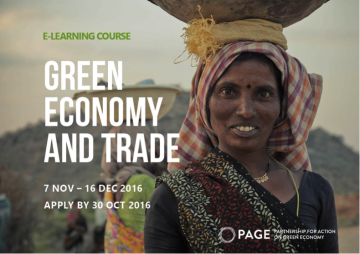
Do you know about the benefits of greening trade? Learn more about how trade in environmental goods and services can drive the transition to an inclusive green economy! The new e-learning course ‘Green Economy and Trade’, organized by UN Environment and UN Institute for Training and Research, starts on 7 November 2016.
Geared towards policymakers and other stakeholders globally, the course introduces concepts at the nexus of trade and the environment, and practical applications in 6 weeks.
Click here for registration and fellowships.
ABOUT THE COURSE
Trade in environmental goods and services (EGS) offers significant opportunities, in particular for developing countries, to drive economic development while protecting natural capital and creating better livelihoods for citizens. In order to seize these opportunities, UNEP and UNITAR are collaborating within the Partnership for Action on Green Economy (PAGE), to deliver the first interactive e-learning course at the nexus of trade and the green economy.
The e-course introduces various concepts, policy instruments and enabling conditions to identify, assess and harness benefits of sustainable trade in the context of the 2030 Development Agenda. Moreover, participants will acquire basic skills for translating sustainable trade principles into a real-world economic, policy and professional context.
LEARNING OBJECTIVES
After completing the course, participants will be able to:
- Interpret current developments and trends related to Green Economy and Trade
- Discuss basic principles related to the international governance of trade and the way the international trade framework can foster sustainability
- Discuss opportunities, challenges, and enabling conditions for developing countries to benefit from growing trade in EGS
- Identify possibilities for greening trade in specific sectors, foremost renewable energy and agriculture
- Apply the green economy approach to a real life trade-related case study
TARGET GROUP
The course targets groups and individuals from the public, private and civil society sectors interested in learning about how sustainable and responsible trade can help to further green economy objectives.
The target group includes:
- Policy makers involved in developing and setting up policy frameworks for sustainable development, and in particular sustainable trade (ministries of trade, environment etc.)
- Private sector/industry representatives, esp. SMEs, interested in understanding the economic opportunities from trade in environmental goods and services (in terms of market access etc.)
- Civil society representatives with an interest in promoting sustainable development and trade
METHODOLOGY
The course didactics are adapted to professionals in full-time work. Participants are provided with the opportunity to learn through various experiences: absorb (read); do (activity); interact (socialize); and reflect (relate to one’s own reality).
Total number of learning hours: 32 hours over a 6-week period, including study time and participation in online course activities.
During weeks 1 – 4 the study of learning journals is complemented by a range of learning activities and experiences such as discussion fora and interactive exercises. Weeks 5 – 6 are reserved for the development of an Action Plan and subsequent peer-review.
REGISTRATION AND FELLOWSHIP
You can register below or you can go to the UNITAR course catalogue: www.unitar.org/event
The participation fee is 600 USD.
A limited number of fellowships are available for eligible candidates.
UNITAR, working in close collaboration with UNEP, will identify and select the participants who will be awarded with a fellowship.
Fellowship application deadline:
30 October 2016
To find out how to apply for a fellowship, contact: page [at] unitar.org
